
There has been lots of debate around the topic of fake meats. Some people swear by them, insisting that they’re the future of food and that there’s no comparison to the real thing. Then there are others who believe that anything other than meat from a living animal is gross and unnatural.
Are “Fake Meats” good or bad? Let us see the arguments so you may decide for yourself.
While I am for eating more plant-related foods, I probably will never become a full vegetarian. I love all kinds of food too much. Probably you do also. But I can’t dispute a Harvard study where vegetarians live up to 26 years longer than carnivores. (I need to find the link to the study).
Below are several links that delve further into explaining different aspects of fake meat.
https://www.mic.com/life/fake-meat-healthy-environment
Fake meat has been around since 1896, the first known plant-based meat product was called Nuttose. Kellogg created this term for the purpose of helping to stop Americans from eating so many heavy foods. What Kellogg produced was a meatless cheesy mass made out of peanuts that could be sliced, stewed, and hashed.
Oregon Chef Paul Wenner, in 1980 ground up some leftover vegetables and turned them into “gardenburger”. It was so popular that Wenner started selling his burgers out of a van. I don’t think this was accepted by Eastcoasters and the Midwest. I did try this product and it was not to my liking at all.
By the 1990s, other companies wanted in on the increasingly lucrative fake meat industry. They made products out of soy, rice, wheat, and mushrooms. Most of them looked and tasted like salty cardboard.
The meatless meat market is expected to be worth $140,000,000,000 by 2029 according to research at Barclay’s.
Proponents of fake meat claim that it is better for your body. Most experts agree because most meat alternatives have fewer calories than animal products – but they are also highly processed and contain absurd amounts of sodium and preservatives.
In the past decade, companies have been racing to make the bloodiest, meatiest product. “bleeding” faux meats, like Impossible Burger, are made of genetically modified soy proteins. A lot of people wonder if these highly processed products are actually better for people or the planet.
Is eating fake meat good for the environment? Scientists largely agree that eating fake meat is better for the environment than eating animals.
Producing a Beyond Burger, for example, uses 99% less water, 90% fewer greenhouse gasses, and 46% less energy than making a beef burger according to the university of Michigan Center for Sustainable Systems.
Still, anything that comes in a shiny package also comes with a carbon footprint, and the reality is that fake meat has always been more of a marketing gimmick than a nutritional plan.
Most experts think the best thing for your body and the planet is to eat a plant-based diet high in whole foods and low in processed foods, including fake meat.
I don’t know who still needs to hear this, but we are literally born onto a planet that grows food.
If you want to know more about the recent history of fake meat, here is a handy timeline and some context on the ancient origins of meat alternatives.
https://www.motherjones.com/environment/2013/12/history-fake-meat/
https://www.foodandwine.com/cooking-techniques/plant-based-meat-china-taiwan-buddhist-vegetarian
If you want to learn more about what scientists think of fake meat, check out this research published in the Journal of the American Medical Association, “Can Plant-Based Meat Alternatives Be Part of a Healthy and Sustainable Diet?
https://jamanetwork.com/journals/jama/article-abstract/2749260
If you want to know more about how your food choices impact your health and the health of the planet, there is a growing movement to create a Planetary Health Diet known as “PHD”. To join the movement check out these resources:
https://eatforum.org/learn-and-discover/the-planetary-health-diet/
https://nowthisnews.com/videos/food/planetary-health-diet-could-save-lives-transform-planet
I have not yet mentioned this new science thing where meat cells are being replicated in a lab to create all kinds of meat, fish, and poultry. While I am interested in learning more about that kind of thing, I still don’t like the idea of my food being messed with. Science has had a huge hand in our ingredients by taking what consumers like and finding ways to promote those qualities. Honestly, as a chef who celebrates food, I would rather educate on the foods the way they were if left alone.
© Chefsville. All Rights Reserved.